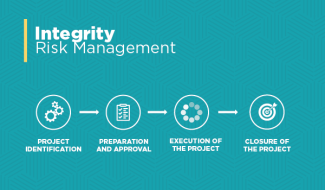

Integrity Risk Management
Throughout the project cycle, the Office of Institutional Integrity (OII), guides project teams, on the identification and assessment of integrity risks and vulnerabilities that may have an adverse impact on the Bank’s efforts to achieve its development goals and on its reputation. Once the integrity risk is evaluated and there is an agreement with project teams that mitigation is required, OII advises project teams on the design of practical and targeted measures to address it.
To manage integrity risks in SG operations, OII focuses on identifying and correcting weaknesses and vulnerabilities that could enable members of executing agencies, bidders, suppliers, contractors, consultants or other participants in IDB-financed operations to engage in prohibited practices or unethical behavior.
Project Identification:
- OII uses information regarding potential integrity risks in a project under preparation, it works together with the project team on assessing those risks and their potential impact to determine whether mitigation measures are necessary.
Preparation and Approval:
- OII and the project teams agree on and approve recommendations to be incorporated into the design, institutional arrangements and/or execution mechanisms of the project.
- The Guidelines to Process Loans Based on Results (GN-2869-3) and the Project Risk Management for Sovereign Guaranteed Operations (OP-1699-1) require consultation with the SG preventive function of OII to ensure proper management of integrity risk and its associated reputational impact.
Execution of the project:
- During the project execution, OII offers support to project teams to manage and prevent an integrity risk in Sovereign Guaranteed (SG) operations if either OII, the project team or any other party identify an integrity red flag.
Closure of the Project:
- Existing guidelines require that lessons learned on integrity-related matters identified through OII investigations or analyses be considered in the Project Completion Reports (PCRs) to prevent the occurrence of similar integrity risks in future projects, and that the confidential nature of the information be properly addressed. This knowledge-sharing increases accountability and learning.
Resources:
OII uses the following tools and approaches to advise project teams on integrity risk management.
- Consultations: OII responds to specific consultations from project teams and senior management and reaches out to operational staff when allegations or preliminary findings of investigations lead OII to make specific recommendations to improve integrity risk management. In specific cases when integrity risk is deemed high, OII staff may participate as a member of a project team to be able to adjust the mitigation strategy in real time and ensure that integrity matters are part of discussions concerning the program.
- Lessons learned and advisory notes: OII extracts and documents lessons from investigations in Reports of Investigations or advisory Notes that are shared with the relevant IDB managers and staff. In a Report of Investigation (ROI), OII communicates to Management and project teams any operational or integrity deficiencies or weaknesses identified during an investigation completed by OII and suggests concrete actions to address them in the investigated project and in situations or projects with similar characteristics. Advisory Notes communicate time-sensitive indicators of integrity risk to operational staff and management while an investigation is underway and recommend immediate actions to address imminent risks. The Bank may share findings and conclusions reflected in the ROI’s with the government authorities responsible for implementing or overseeing implementation of the affected IDB-financed operation.
- Integrity Risk Reviews (IRRs): Review of an IDB-financed program that is conducted by OII in close cooperation with project teams to identify factors that increase integrity risk and its reputational impact on the program. In broad terms. This preventive tool examines: (i) internal controls; (ii) procurement; (iii) financial management; (iv) asset verification; (v) governance. IRRs can also be conducted to specific sectors or cross-cutting topics.
- Trainings: In relation to Bank-financed operations and in addition to the training OII provides to IDB employees, OII also offer capacity building workshops to external audiences. These activities seek to (i) increase awareness of the IDB integrity framework and relevant policies, and the corresponding responsibilities of executing agencies, beneficiaries, and private sector entities; and (ii) provide tools to manage integrity risk in IDB Group-financed operations.